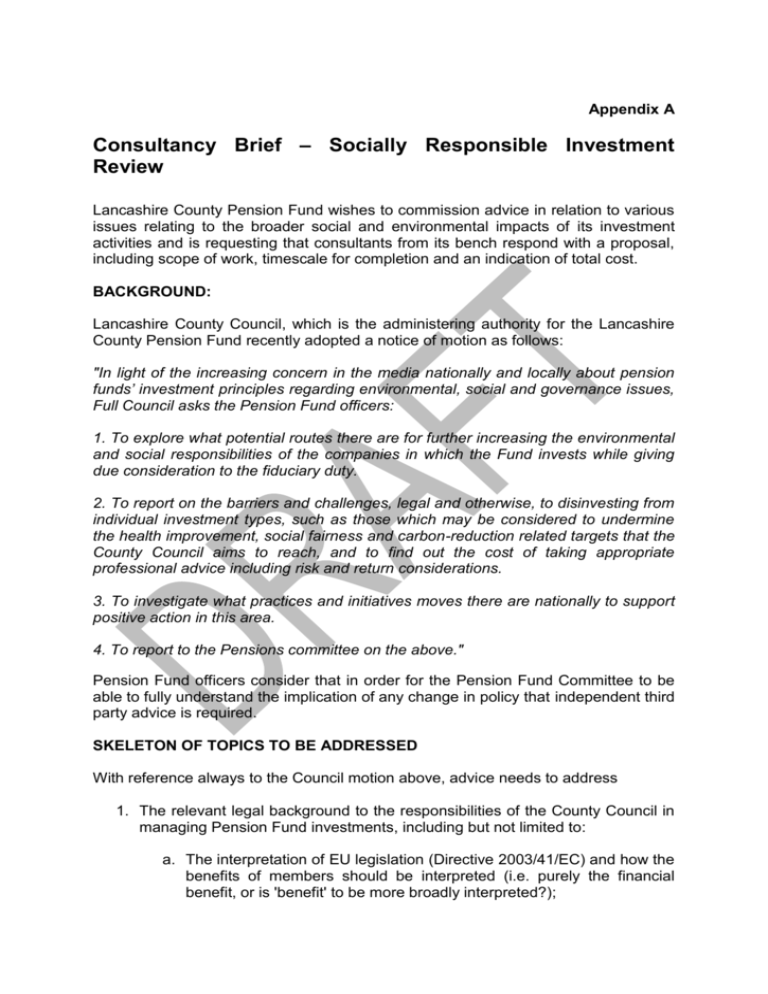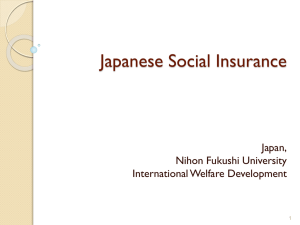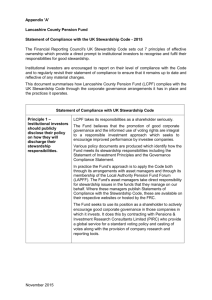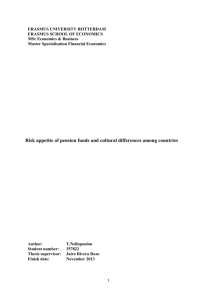View as DOCX (11/2) 26 KB - Lancashire County Council
advertisement

Appendix A Consultancy Brief – Socially Responsible Investment Review Lancashire County Pension Fund wishes to commission advice in relation to various issues relating to the broader social and environmental impacts of its investment activities and is requesting that consultants from its bench respond with a proposal, including scope of work, timescale for completion and an indication of total cost. BACKGROUND: Lancashire County Council, which is the administering authority for the Lancashire County Pension Fund recently adopted a notice of motion as follows: "In light of the increasing concern in the media nationally and locally about pension funds’ investment principles regarding environmental, social and governance issues, Full Council asks the Pension Fund officers: 1. To explore what potential routes there are for further increasing the environmental and social responsibilities of the companies in which the Fund invests while giving due consideration to the fiduciary duty. 2. To report on the barriers and challenges, legal and otherwise, to disinvesting from individual investment types, such as those which may be considered to undermine the health improvement, social fairness and carbon-reduction related targets that the County Council aims to reach, and to find out the cost of taking appropriate professional advice including risk and return considerations. 3. To investigate what practices and initiatives moves there are nationally to support positive action in this area. 4. To report to the Pensions committee on the above." Pension Fund officers consider that in order for the Pension Fund Committee to be able to fully understand the implication of any change in policy that independent third party advice is required. SKELETON OF TOPICS TO BE ADDRESSED With reference always to the Council motion above, advice needs to address 1. The relevant legal background to the responsibilities of the County Council in managing Pension Fund investments, including but not limited to: a. The interpretation of EU legislation (Directive 2003/41/EC) and how the benefits of members should be interpreted (i.e. purely the financial benefit, or is 'benefit' to be more broadly interpreted?); b. The requirement (or convention) for Pension fund management to be considered separately and distinctly from the other activities of the County Council and whether a policy stance integrating management of the Pension Fund with other policy objectives could be in contravention of regulation or other legal principles; c. Fiduciary duties and their interpretation in relation to a fund with a government sponsor – consideration of potential liabilities arising, whether to the Council as a whole, members individually or its officers (and commentary on the scale and likelihood of any such liabilities arising) It is accepted that the Fund will need to take separate and specific legal advice on these issues should it decide following this work to make any change in its policies. 2. Examples of practice in relation to investment strategies driven by social and environmental responsibility from the private sector and other public sector funds, both in the UK and where relevant, overseas (subject to commentary as to whether any specific overseas practices would be compliant with UK/EU law and regulation) 3. Advice on a. The avenues by which pension funds typically seek to influence the social and environmental responsibility of the companies in which they invest and how effective such strategies appear to be. b. The evidence available of the impact of disinvestment by a pension fund on a company and the long term impact that such disinvestment has on the ability to influence the social responsibility of the companies in question. c. The evidence available in relation to the impact on performance of pension funds which have disinvested from companies on grounds of social responsibility. 4. There is a broad spectrum of definitions available in terms of environmental and social responsibility. Advice is sought about how such definitions or thresholds/appetites for different types of investment can be decided upon and applied by the Pension Fund, with reference to solutions, if any, observed in other funds 5. The notice of motion seeks to understand the implications of applying the Council's health improvement, social fairness and carbon-reduction targets to the Pension Fund's investments. Advice is sought as to the range of companies that may potentially need to be disinvested in order to ensure that the Pension Fund holds no investments that could be seen to undermine such targets. The potential impact upon portfolio performance (both return and risk) should be illustrated using historic performance data for a suitable residual portfolio versus a typical market index and over periods of time considered appropriate for such analysis 6. In addition, the fund has the ability to invest in gilts and bonds, as well as Emerging Markets Debt and other forms of lending together with investments in private equity, infrastructure and property. Similar advice to the point above is sought in relation to the potential impact, if any, of a change in policy stance on these portfolios, although it is accepted that detailed modelling and back testing will not be possible to the same degree in these areas. 7. Concerns that have been raised by market commentators in relation to the implementation of restrictive investment strategies include a. the potential for the development of an unbalanced portfolio, b. the inability to invest in companies that are resilient in different market conditions, c. the potential to miss out on excess returns generated by certain sectors; d. the potential impact of 'churning' of the portfolio as policy priorities and direction change over time. Advice based on the modelling required at points 5 and 6, validating, challenging or dismissing these concerns, as well as considering other relevant issues associated with such strategies, is invited. 8. Advice is sought as to whether a 'positive investment' strategy, seeking to actively invest in initiatives / companies that are seeking to deliver health improvement, social fairness and carbon-reduction would: a. Be permissible within the relevant legal frameworks, either in addition to, or instead of, disinvestment, b. If so, whether the performance of such a strategy (in terms of return, risk and volatility) would compare favourably or unfavourably with either the current strategy or the residual strategy modelled at point 5. 9. Any other information, relevant research, advice and comment pertinent to the issues raised by the notice of motion.







